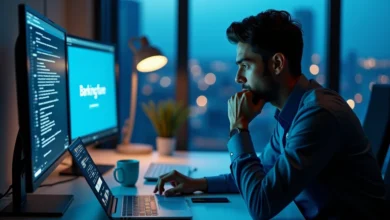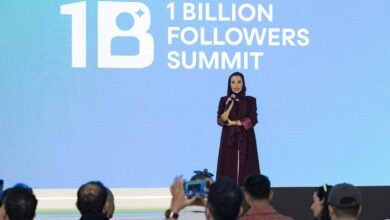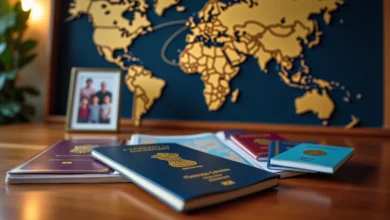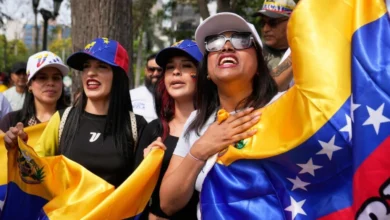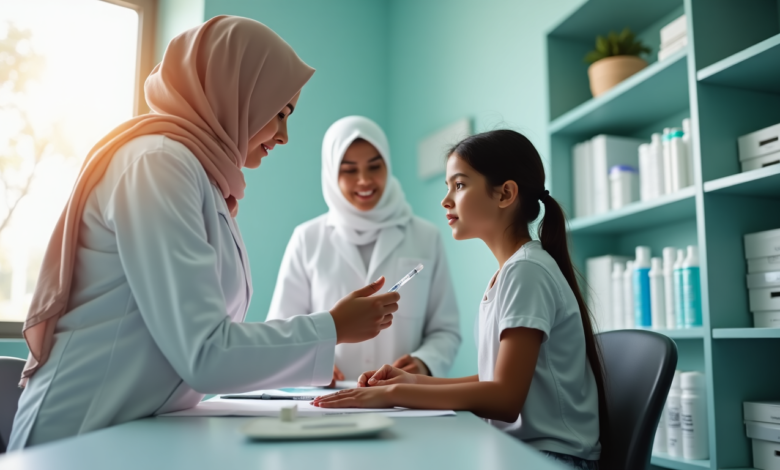
UAE Sets 90% HPV Vaccination Goal to Shield Young Girls
Cervical cancer takes the lives of around 342,000 women worldwide and stands as the fourth most common cancer among women globally. The World Health Organization’s latest data shows that doctors diagnosed 604,000 women with this preventable disease in 2020. The UAE leads the way as the first country in the Eastern Mediterranean region that added the HPV vaccine to its national immunization program in 2018.
The UAE’s Ministry of Health and Prevention (MoHAP) wants to vaccinate 90% of girls against HPV by 2030 before they reach 15 years of age. The country’s cervical cancer rates remain below the global average, though it ranks as the fifth most common cancer among UAE’s women. This shows how well their preventive measures work. Medical experts stress that the HPV vaccine works best when given before any exposure to the virus. Early vaccination plays a vital role to protect the next generation.
UAE Launches Ambitious HPV Vaccination Campaign

Image Source: menafn
The UAE’s Ministry of Health and Prevention (MoHAP) has rolled out a bold national strategy to curb human papillomavirus (HPV) and reduce cervical cancer cases in the UAE. This strategy aims to vaccinate 90% of girls against HPV before they turn 15 by 2030.
The UAE made history in 2018 as the first Eastern Mediterranean country to add the HPV vaccine to its national immunization program. The program started with schoolgirls aged 13 to 14[62]. The coverage expanded in 2023 to include boys of the same age group, creating a complete approach to HPV prevention[52].
“The vaccine covers nine of the highest-risk strains of the HPV virus,” said Dr. Stephanie Ricci from Cleveland Clinic Abu Dhabi. Girls-only vaccination tackles just half the problem since males can also spread HPV. The vaccine helps protect boys from genital warts and anal cancer.
Students receive their vaccines through the School Health Vaccination Program, which started giving shots to male students in the 2023-2024 academic year. Emirati boys and girls can get the vaccine without any cost.
Parents still don’t know much about how the vaccine benefits boys, despite recent progress. Many families haven’t learned about the advantages of HPV vaccination for males, which shows we need better educational programs.
The UAE’s strategy lines up with the World Health Organization’s worldwide plan to eliminate cervical cancer as a public health issue. Health authorities must reach about nine in ten girls before age 15 to meet this goal.
The national plan also includes regular cervical cancer screening for women from age 25. This creates a dual strategy of prevention and early detection. Ministry officials have shown their steadfast dedication to spreading awareness about vaccination benefits, which keeps the UAE pioneering regional public health initiatives.
How Parents Can Access Free HPV Vaccines in Dubai

Image Source: Emirates Hospitals
The UAE has made HPV vaccinations more available by a lot over the last several years, especially when you have specific demographic groups. Parents who want to protect their children against HPV can now take advantage of several vaccination programs in Dubai and other emirates.
Female students between 13 and 26 years can get HPV vaccines for free. On top of that, patients who have Daman or Thiqa insurance between 18 and 26 years can get the vaccine without paying. Emirati citizens have even better options – all Emirati boys and girls can get free HPV vaccinations whatever their age.
The Department of Health (DoH) has given free HPV vaccinations to schoolgirls in grade 11 across Abu Dhabi since 2008. The vaccine is now available at all Seha centers throughout Abu Dhabi. Health authorities strongly suggest that women between 15-26 years should get vaccinated against HPV to prevent cervical cancer.
Families can schedule vaccinations through several convenient options. They can book appointments through healthcare facility websites, Smart Apps, or call the 24/7 Customer Experience Team at 800 60. People can get vaccines at many locations:
- Primary healthcare centers
- School-based immunization programs
- Family medicine clinics
- Pediatric and gynecology departments
Non-Emirati residents can get the vaccine through private healthcare, but costs vary. Prices usually range from Dh600 to Dh1,100 per dose based on the facility. Some centers like JTS Medical Center offer the Gardasil 9 vaccine at AED 925 per dose.
The UAE’s vaccination strategy matches global health recommendations. Children aged 9-14 need two doses, spaced 6-12 months apart. People 15 and older typically need three doses. This detailed approach shows the country’s steadfast dedication to preventing HPV-related diseases through available immunization options.
Doctors Address Common Concerns About HPV Vaccine

Image Source: Dr. Helena Taylor Clinic
UAE medical experts are tackling HPV vaccination concerns as parents show hesitation about their children’s immunization. Healthcare professionals point to the vaccine’s strong safety record, with more than 270 million doses given worldwide since 2006.
Parents mostly worry about safety, yet studies reveal serious side effects are rare – just 1.8 cases per 100,000 vaccine doses (0.0018%). Most people experience mild, short-term effects like injection site pain, headaches, and sometimes dizziness.
“The HPV vaccine is classified as safe and can effectively protect children and adults from HPV-related diseases,” explains a specialist at CMC Dubai. Swedish research proves that HPV vaccination cuts cervical cancer rates by 86% in girls who get vaccinated by age 16 or younger.
Cultural factors shape vaccination choices in the UAE, yet attitudes continue to improve. “I think we see a lot of young people showing interest in vaccination,” says Dr. Seema Sen from Danat Al Emarat hospital. “Parents are realizing that this vaccination is not to promote sexual promiscuity but protect women because 99% of cervical cancers arise in the background of HPV”.
UAE parents show promising support – 76.6% say they would vaccinate their daughters, and this number rises to 92.9% with official health recommendations. Some parents still hesitate because they feel they lack information (40%) or worry about side effects (45.3%).
Medical experts notice that presentation makes a big difference. “Parents are more likely to vaccinate their children when they understand that the HPV vaccine is a cancer-prevention tool, not just a vaccine for a sexually transmitted infection,” says Dr. Moustafa Aldaly from International Modern Hospital, Dubai.
UAE doctors stand firmly behind the vaccine’s safety and its ability to protect against various cancers, including cervical, anal, penile, and oropharyngeal cancers.
Medical evidence shows how the HPV vaccine plays a crucial role in preventing cervical cancer and other HPV-related diseases. The UAE leads the region with its complete vaccination program that makes the vaccine available to its population while setting ambitious goals.
Success rates prove remarkable results, especially when vaccination happens early. The program’s expansion now includes boys, which marks another vital step forward. This change recognizes that everyone needs protection against HPV-related cancers.
UAE’s healthcare professionals help parents learn about the vaccine’s safety and benefits through education and awareness programs. Their work, combined with the government’s steadfast dedication to making vaccination programs available, puts the UAE on track to reach its 2030 vaccination targets.
Scientific data backs up this preventive approach’s effectiveness. The vaccine reduces cervical cancer rates by up to 86% in early recipients. More families welcome vaccination as awareness spreads, and the UAE moves closer to protecting future generations against HPV-related diseases.



